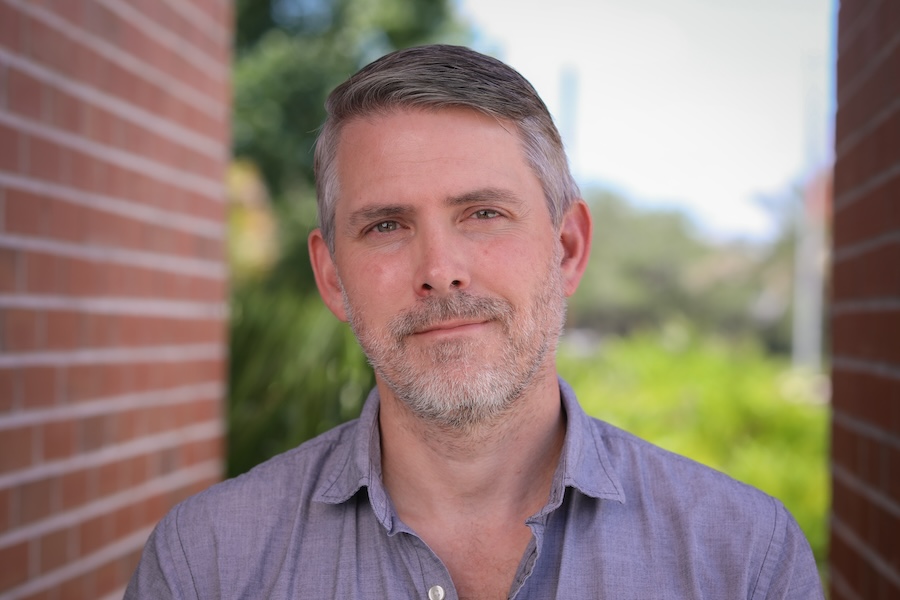Faculty Spotlight: Jeffrey Chagnon

Jeffrey Chagnon is a teaching faculty member in Florida State University’s Department of Earth, Ocean and Atmospheric Science, part of the College of Arts and Sciences. After earning his doctoral degree from Pennsylvania State University in 2003, Chagnon became a research fellow for the National Centre for Atmospheric Science Research. This fellowship allowed Chagnon to conduct research on atmospheric dynamics at the University of Reading in England. Chagnon came to FSU in 2013, and he earned an Outstanding Teaching in the Major Award in 2022.
Tell us a little about your background, where you’re from and what brought you to FSU.
I’ve always loved both mathematics and the natural world, so during my undergraduate years, I double-majored in mathematics and meteorology at the State University of New York at Oswego. While pursuing my doctoral degree in meteorology at Penn State, I explored a fundamental problem in geophysical fluid dynamics involving atmospheric waves. After graduation, I moved to England to work in the University of Reading Department of Meteorology where I worked as a research fellow for 10 years before coming to FSU.
Can you break down your areas of research for us?
The broad area of research that I work in is called atmospheric dynamics. A dynamicist develops the theory and mathematical framework describing how air circulates, how storms evolve and organize, and how we may improve upon current methodologies for predicting weather and climate.
What makes you passionate about your topics of research?
I love the process of conducting scientific research. I’m happiest when I’m in the throes of solving a challenging problem. There are dramatic twists, unexpected turns, frustrating dead ends and an exciting sense of anticipation. Science is even better when you can share the experience with others, and I’m fortunate to embark on these journeys with many students at FSU.
Tell us about being an affiliate of the Florida Climate Institute.
The Florida Climate Institute is composed of a vast network of scientists working on a range of topics related to climate and environmental change across the state. My main involvement has been through interactions with students and faculty who work in the Center for Ocean-Atmosphere Prediction Studies. COAPS is an FSU research center that conducts interdisciplinary research to better understand the consequences of climate variability.
From 2004 to 2013, you were a research fellow for the National Centre for Atmospheric Research. Tell us about your experience conducting research at the University of Reading.
Reading, England is an unofficial capital for weather and climate science in the U.K. It’s home to an enormous university meteorology department and a major operational weather prediction center, the European Centre for Medium-Range Weather Forecasts. In my time at the University of Reading, I learned that science is a team sport played by scientists at all levels. This sport is played in the lab, in the field, at a desk, and even during walks and meals.
Who are your role models? Are there certain people who have influenced you most in your life and career?
I’m especially grateful to two professors who had a major impact on my development as a scientist and educator — Kathy Lewis, professor emerita in SUNY Oswego’s mathematics department, and Peter Bannon, professor emeritus of atmospheric science and my doctoral supervisor at Penn State. Both of these professors are kind, patient, and inquisitive and invested time in me. They approached teaching and mentoring with humility and an earnest reverence for the process of learning. They showcased the kind of educator I aspire to be.
In 2022, you earned an Outstanding Teaching in the Major Award from FSU. What did earning this award mean to you?
Teaching is one of the most fulfilling, meaningful, and demanding roles I’ve played as a scientist. I feel sincere gratitude to my students who nominated me, and I’d love to thank them one day.
What is your best memory so far from working at FSU?
I’ve supervised a few doctoral students while at FSU, and my best memories are witnessing students successfully defend their doctoral dissertations. The journey of completing a dissertation is so difficult, testing and transformative. It’s very special to witness a doctoral student arrive at their destination, and I’m often in awe of their resilience and grateful to have played a small part in their academic journeys.
Do you have any exciting upcoming projects or goals you’re working towards?
On the teaching front, I’ve recently been developing a curriculum to help FSU EOAS students sharpen their understanding and proficiency using advanced mathematics for science. Math can be a barrier for many students, not because they lack the capacity, but because they lack preparation or perspective. Math is also a major source of anxiety for many students, so I’m excited by the opportunity to help more students succeed.
If your students only learned one thing from you (of course, hopefully they learn much more than that), what would you hope it to be?
Your life and career will evolve nonlinearly. While planning is important, you can’t predict all the options that will or won’t be available in the future. Being open-minded, flexible, and willing to take risks is the way to maximize your happiness — even if it means straying from your original plan.
